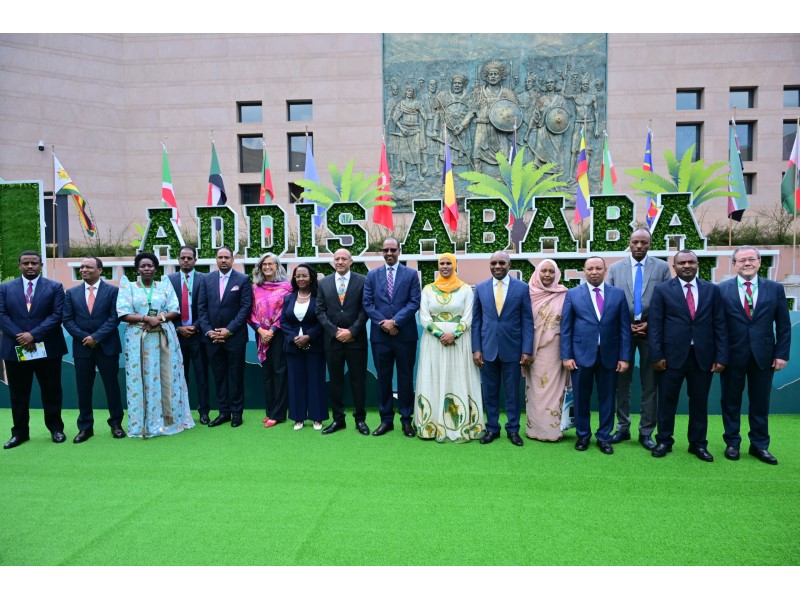Addis Ababa, 4 September 2024 (ECA) - African cities are vital to the continent’s economic and social development, contributing over 50% of Africa’s GDP. However, the rapid pace of urbanization has brought about a host of challenges, including underdeveloped infrastructure, climate vulnerabilities, and socio-economic inequalities. This was stated by Stephen Karingi, Director, Regional Integration and Trade Division of the Economic Commission for Africa at the opening of the 4-6 September inaugural Africa Urban Forum on the theme, “Sustainable Urbanization for Africa's Transformation – Agenda 2063” in Addis Ababa.
Co-organized by the Government of Ethiopia and the African Union Commission, in partnership with UN-Habitat and the Economic Commission for Africa (ECA), the Forum is being held against the backdrop of critical challenges in Africa’s rapid urbanization that need a collective resolve, while promoting the opportunities. Experts predict that 60% of Africans will reside in cities by 2050, and according to Karingi, the need for sustainable urban solutions has never been more critical.
“We need to ensure that African cities are not only engines of growth but also exemplars of sustainable and inclusive development. The time for action is now, and with collective effort, we can pave the way for a brighter, more sustainable future for all urban dwellers in Africa,” said Mr. Karingi, speaking on behalf of the ECA Executive Secretary, Mr Claver Gatete.
The Forum is exploring financing options, forging partnerships, and advancing solutions for sustainable urbanization with the goal of committing to actionable strategies that can transform urban landscapes across the continent.
He stressed the need for sound macroeconomic policies and development financing for stable and robust economic environments, highlighting regional integration, economic diversification and industrialization “as important for enhancing the competitiveness of Africa’s economies and strengthening economic resilience and industrial base.”
Mr. Karingi also underlined the need to prioritize infrastructure, technology connectivity, and energy to build the backbone of modern, efficient cities that can support sustainable development.
“In addition, we must also address climate change and food security because sustainable urban development must be resilient to environmental changes,” he added.
In response to these pressing challenges, the Economic Commission for Africa (ECA) is working with member states to create stable and robust economic environments that foster growth, to enhance development financing for urban infrastructure and services.
“The ECA is collaborating with development banks and private sector stakeholders to develop innovative financing mechanisms tailored to the unique needs of African cities. These partnerships will ensure that cities have the necessary capital for sustainable infrastructure, affordable housing, and essential services,” said Karingi.
There are also efforts underway to strengthen the competitiveness of African economies to bolster resilience and enhance the industrial base across the continent, such as providing technical support for the implementation of the African Continental Free Trade Area (AfCFTA), developing frameworks for climate-smart infrastructure projects, promoting sustainable urbanization through national policies, and collaborating with local governments to enhance financial management for urban development.
“Furthermore, ECA recognizes the need for technology connectivity and reliable energy sources as these are essential for building modern and efficient cities capable of supporting sustainable development. We are also leveraging technology and innovation in urban management, producing analytical reports, and creating the Africa Urban Portal. These resources, offer valuable insights into urban development trends, guiding policymakers in making informed decisions about sustainable urban growth,” he said.
In addition, addressing climate change and ensuring food security are crucial components of sustainable urban development to allow cities to remain resilient to environmental changes and be able to thrive in the long term.
These efforts, he stressed, align with key African Union strategies, particularly Agenda 2063, which envisions cities that are livable, equitable, and resilient.
In partnership with UN-Habitat and the United Nations Capital Development Fund (UNCDF), the ECA is leading initiatives to expand the municipal fiscal space in African cities. This effort empowers local governments to effectively generate and manage financial resources, enabling them to invest in critical infrastructure and services.
Issued by:
Communications Section
Economic Commission for Africa
PO Box 3001
Addis Ababa
Ethiopia
Tel: +251 11 551 5826
E-mail: eca-info@un.org
